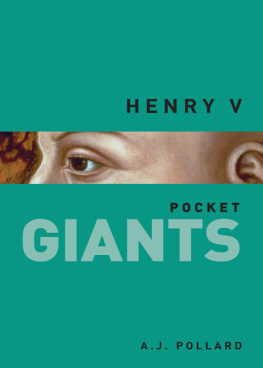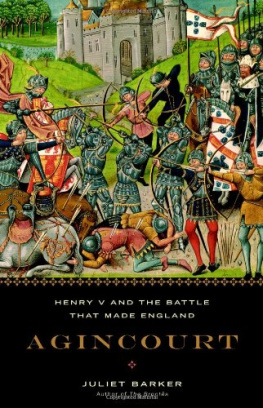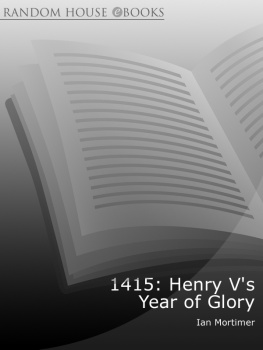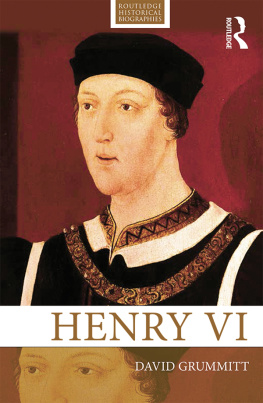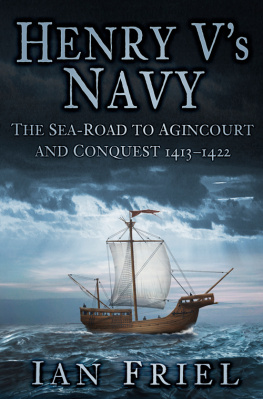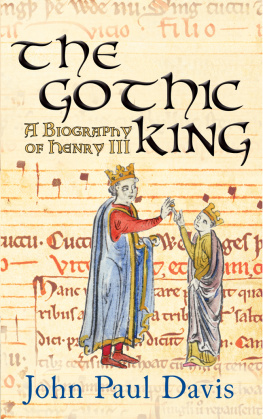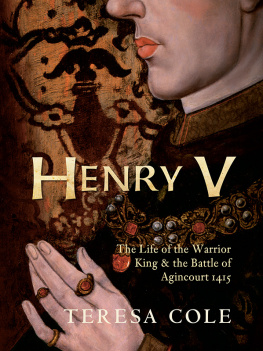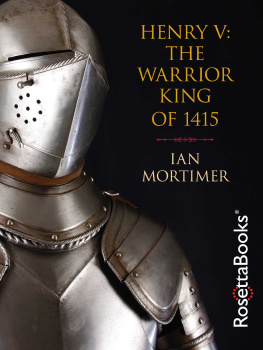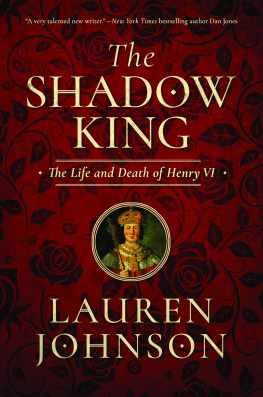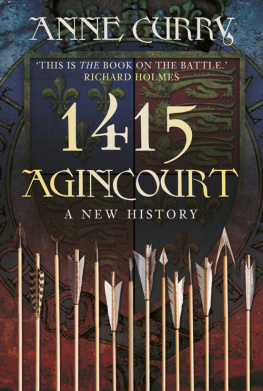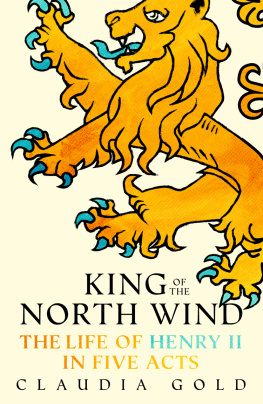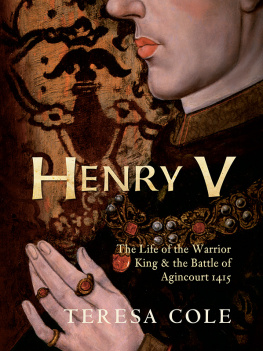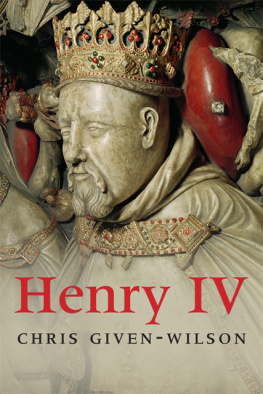I was commissioned to write a short life that was opinionated and with attitude. I hope I have not disappointed in that respect and have not upset too many of my colleagues as a result. They know that I am not a great admirer of Henry of Monmouth. The format, which reduces the scholarly apparatus to a minimum, does not allow me to acknowledge their work as directly as I would have liked. Many of them, who are contributors to a collection of new essays on Henry V edited by Gwilym Dodd, will recognise the borrowed line, the lifted detail, the sentiment here or the slant there. Thank you. In addition, I would like to thank Keith Dockray for allowing me to plunder his survey of the historiography, Dick Kaeuper for giving me confidence to be blunt about chivalry, Tig Lang for putting me right on Henry Vs facial wound and Tony Morris for twisting my arm.
Eryholme,
12 June 2013
Contents
It snowed heavily the day Henry V was crowned: 9 April, Palm Sunday, 1413. Writing a few years later, Thomas Walsingham, the resident chronicler at St Albans abbey, recalled two interpretations of this unseasonable weather. Some thought it portended that the new king would be cold hearted and rule his subjects harshly; others took it as an omen that vice would be frozen and new virtues would flourish in the coming spring. In the event, as Walsingham surely intended his readers to understand, both were right. Henry proved to be a cold-hearted, ruthless monarch, yet his rule also represented a new beginning and gave his nation fresh hope after the troubled reigns of his predecessors.
This King of England, whose reign had such a chilly start, was a giant of his age. Not simply because he was a great and famous warrior and a paragon of military virtue. He was a giant because he imposed himself on his contemporaries. He was feared, famed and respected by all, his enemies as well as his friends. He truly bestrode his world.
Thanks to Shakespeare, Henry V is the best-known military hero in English history; more famous even than Marlborough or Wellington, let alone his mighty great-grandfather, King Edward III, who reigned for over fifty years. He enjoyed more success against the French, the ancient enemy, than any of them, coming tantalisingly close to conquering that vast country and imposing an English dynasty. He did this in a reign of just nine years, seven years of which he was at war. Even before he died at the tender age of 35, the myth of his greatness was being created, and it was further honed in subsequent decades. Shakespeares play has become the touchstone of English national pride, English courage and English imperialism. For good or ill, Henry V embodies the military might of England.
He was a remarkably successful soldier, yet his warrior skills were not always deployed in the best interests of his kingdom, let alone the people of Wales or France who suffered at his hands. Serious questions arise concerning his judgement. Was a war of conquest in France really sustainable? Did he damage his own realm in pursuit of foreign glory? Was he truly a figure of Christian piety and virtue? Or did there lie behind the carefully constructed chivalric image, a cold, calculating and manipulative autocrat?
These are some of the questions this book explores. It seeks to explain why Henry V was so successful, so admired and so idolised. But this is not another exercise in hero-worship. There is no doubt that Henry V was an awe-inspiring man, a charismatic leader, an astute politician, a gifted administrator and a brilliant general. However, Thomas Walsinghams hope of a new beginning was to prove an illusion, and the tragic legacy of Henrys nine hectic years on the throne was embroilment in an unwinnable war and domestic problems stored for the future.
So blest a son: Childhood
and Youth, 13861406
Henry V was born at Monmouth on 16 September 1386. He was not expected to become king. But he was in direct line of succession to the throne, as great-grandson of King Edward III, grandson of John of Gaunt, Duke of Lancaster, and eldest son of Henry of Bolingbroke, Earl of Derby. The house of Lancaster was the most powerful in England under the throne and Time-honoured Gaunt was the mightiest of magnates, a European prince and by far the kings richest subject, with hundreds of lords and knights retained in his service throughout the realm. Bolingbroke, Henrys father, was a great noble in his own right and a young man of chivalric renown. He became embroiled in the factional politics of King Richard IIs court during Gaunts absence overseas in the years 138689. He then set out himself on foreign ventures, first on crusade to Prussia and then on pilgrimage to the Holy Land between 1390 and 1393.
The boy Henry saw little of his father, but this was not unusual: until the age of 7 noble children were usually cared for in their mothers household. When he later became king, he remembered his nurse, Joan Waryn, to whom he granted an annuity of 20. His mother, Mary Bohun, the joint heiress to the Earldom of Hereford, died in June 1394. What impact her death had on the 7-year-old we do not know, although he commissioned an image for her tomb in the church of St Mary de Castro in Leicester on his accession to the throne. Throughout his life he remained close to his maternal grandmother, Joan, the dowager countess who almost certainly influenced his religious development.
He may already have moved, when he was 7, to the household of his grandfather for the customary next stage of his upbringing. Here, as well as military training (he attended his first tournament when he was 10) and schooling in the arts of hunting and falconry, he received a liberal education. His tutor was his young uncle Henry Beaufort, later the Cardinal Bishop of Winchester, one of Gaunts sons by Katherine Swynford. Young Henry was supplied with grammar books and learnt to play the harp. When he was still only 12 he joined the household of King Richard himself at which point his childhood was dramatically and prematurely brought to an end.
In normal times, entering the royal household would have been unexceptional. But times were far from normal. In 1398 Henrys father, Bolingbroke, had clashed with the king and had been exiled for ten years. Gaunt had secured an undertaking that, should he die, his heir, now Duke of Hereford, would be able to enter his vast Lancastrian inheritance. After Gaunts death in 1399, the king broke his promise and took the estates into his own hands. Bolingbroke, in Paris, made immediate plans to return to England to recover his right. Richard II, who must surely have anticipated such a reaction, nevertheless pressed on with an expedition to Ireland. With him he took young Henry of Monmouth, to whom he had granted an annuity of 500. Later it was said that a personal bond developed between man and boy, Richard taking the emotional place left vacant by an absent and distant father.
Richard II left the kingdom in charge of his uncle, the Duke of York. He was still in Ireland when Bolingbroke landed at Ravenspur on the coast of Yorkshire. Bolingbroke claimed that he had returned only to recover his rightful inheritance and reform the misgovernnment of the realm. In this he received considerable support, not only from his own and his late fathers numerous Lancastrian followers, but also from neutrals such as the powerful Earl of Northumberland. When, a week or two later, Richard II hurriedly returned to North Wales, Henry was already, in effect, in command of the kingdom. The Duke of York had defected; Bristol had fallen; and Chester, the heartland of Ricardian loyalty, had been secured against the king. The Earl of Northumberland was sent to meet the outnumbered monarch at Conwy and Richard was taken into custody.

